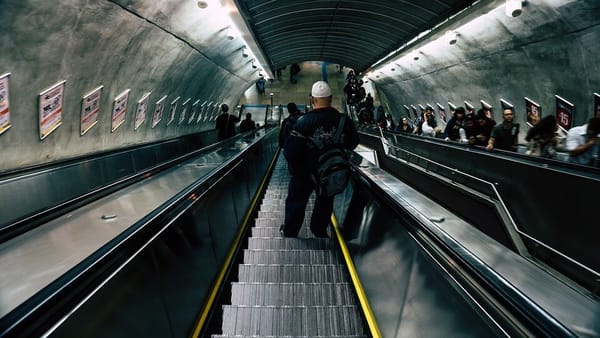Why do looters target Target?
The Editor-in-Chief offers some thoughts on the ongoing US protests in response to the police killing of George Floyd

Today, on Blackout Tuesday, thousands shared an image of a black rectangle to stand in solidarity with the US protestors
Disclaimer: Felix operates as a publishing platform, and as such we welcome a wide array of views. The ongoing situation in the US, and worldwide, is a complex one. While it is uncontroversial to state that racism is abhorrent and needs to be fought, there is much debate about the current tactics of protestors in the US. As a result, this article represents the personal views of the Editor, and not that of Felix as a publication. If you would like to write for us on this issue or any other, get in touch at felix@ic.ac.uk.
We will additionally not be using any hashtags with this post. The use of these hashtags is clogging social media feeds used to organised legitimate protest. We would encourage anybody showing support for the ongoing movement to do the same.
There is much to be said for protest. The right of the general populace to gather and present their views to the world - to their governments, their employers, and to one another - is an essential component of democracy. For those of you who don't quite agree with those democratic principles: I apologise, but in this editorial I'm going to take a priori that they are justified and positive. Take it up with the philosophers of Ancient Greece.
With that said, "protest" is a vague term. It can encompass an enormous range of activities, both active and inactive. I'd personally argue that protest-by-vote is how we ended up with Donald Trump as the POTUS and how we ended up with Brexit. The intent was to express dissatisfaction with a status quo and a political elite that had failed. Posting a black box on social media in a sign of solidarity is also a form of protest, in a way. However, I think most of us - especially with the ongoing situation in the US - tend to think of protest in terms of active demonstrations; large groups of people gathering to show their support for some cause or issue. When I say "protest" henceforth, this is what I am referring to.
The debate around how protest is to be carried out rages fierce right now. The fine line between making oneself heard and degenerating into violent rampaging is hard to define, and hard to manage. It's made more complex when both are happening simultaneously, which is usually the case - a 'vocal minority' can overwhelm and define a movement, although the majority of those involved are doing so peacefully. Mob mentality can reign in one small area, while in another protest is an organised affair.
The thing is, protest is inherently angry. It has something to prove. It seeks to instigate change by proving something - showing that the issue is important, demonstrating that whatever issue is at hand will no longer be tolerated. That need makes it volatile.
I know many of you will feel that burning and looting are justified in the face of extreme prejudice. That's not particularly something I want to argue. I don't think the question to ask is "how do protests go bad?", or even "has this protest gone bad, or is this justified?" I think the question to ask is: "what, when protests turn violent, do protestors target - and why?"
When people are angry at "the establishment", they attack what they perceive to be "the establishment". In the past, this featured guillotining noblemen. The oppression suffered by the common person at the hands of a privileged few was too much to bear, and so they removed what they considered the heart of the problem: the aristocrats, born into their wealth and power, who lorded it over their subjects selfishly.
What's interesting is that, in those olden times, the source of all forms of oppression was somewhat the same. The wealthy and the politically powerful were the same people: the feudal overlords. Racism in the form of slavery, for example, was naturally tied to economic interests - both on the macroscopic national and microscopic individual scales. It made sense that, no matter the issue at hand, the backlash would fall in the same place.
What are protestors targeting right now? Well... they're targeting Target.
This is interesting. Technically, we've seen a separation of legislation and wealth. Target does not draw up the laws or control the police force which perpetrate racist abuse.
If Target were their employer, one might argue that nothing has changed. People are still targeting some perceived source of oppression, the entity that takes their days away from them and squanders it selfishly. You can argue about free markets and capitalism and their merits or deficiencies, but regardless of your personal view, it's easy to imagine an angry person attacking their employer as a source of persecution.
But for those who do not work at Target, as most of the looters do not... why, in response to a racist killing by US police, do they attack what should be an unrelated organisation?
**To hit them where it hurts.**
It ties in to the "technically" sitting innocuously a few paragraphs above. While theoretically we have a separation of capitalist money-making corporations and legislative power, the truth is - obviously - not the case. This is particularly the case in the US, where lobbying power could arguably be said to outweigh that of the voter.
I would claim that the US, in its legislation, has repeatedly demonstrated that the wellbeing of the average citizen pales in significance to the financial security of its largest corporations. For a powerful example, it's worth pointing to the use of the Defence Production Act to remove meat-packing companies from liability to their workers during the COVID-19 pandemic - and the months-long refusal to use it for the production of N95 masks. In the face of decimated supply chains - which were deconstructed over decades solely for the purpose of efficiency and lining the pockets of a few wealthy people - the US government opted to further protect those few above the wellbeing of their workers. Indeed, many of those workers have lost their jobs due to the fragility of supply chains. I won't take credit for this example - instead, go watch Hassan Minhaj talk about it on Patriot Act.
For another, look at the stimulus packages being delivered. Of the $2 trillion promised, more is allocated to business than to benefiting individuals, with a full quarter being delivered specifically to "big business". Only 9% is going towards public services, by comparison. Hell, $17 billion is believed to be going to Boeing for "maintaining national security." Meanwhile, 40 million Americans have filed for unemployment.
So my hypothesis is this: how do you make yourself heard? How do you make the legislators listen? By attacking the things they care about, and that they prioritise. In this case, that's money, economy, finance, dollars, big bucks, and especially the largest corporations - which make the most money, and most importantly invest the most into lobbying, donate the most to political campaigns.
The result of these policies is what we see in the most violent protests.
Looting is a true form of protest when the driving force of your oppression is the complicit relationships of government and corporations. It is the result of the fragility of supply chains in the pursuit of efficient economic gains for the 1%, the lack of funding to public services, the resulting massive unemployment (particularly amongst low-paid workers - often in BAME-dominated communities), and more.
The racist killing of George Floyd was a spark - one that ignited a colossal pile of tinder. That tinder was largely comprised of an undercurrent of discriminatory economic policies - ones that have disadvantaged the American BAME community more than any other, during one of the greatest economic crises in recent history. The protest is about his murder, yes - but it is also about so much more, and will require much more than changes to the US police force to fix.
Whether you believe in the actions of the protestors or not, the targeting of big business on their behalf is the venting of legitimate complaints; it’s not just opportunistic thuggery, as others have claimed.
It also highlights that the protests are far more globally relevant than they would superficially appear. For those of you confused about why those in the UK care so deeply about an American murder - this is why. The deeper story is one that exists in our own country, as well. Food for thought.





